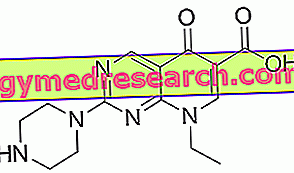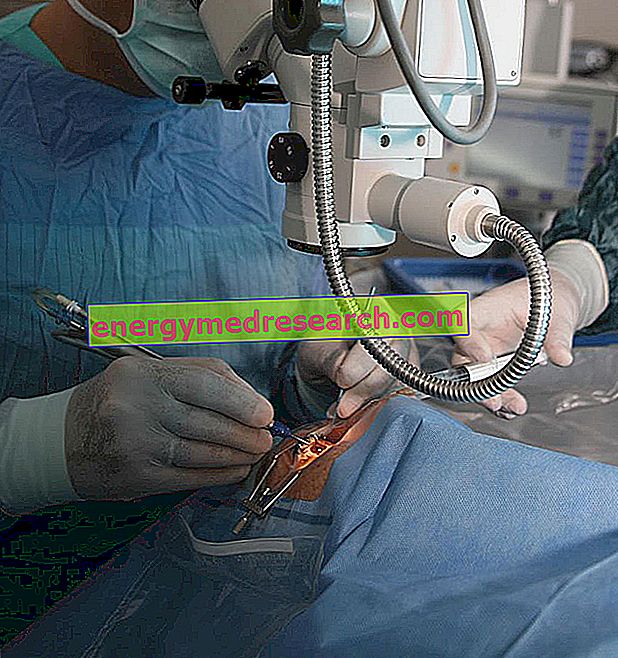Pipemidic acid is a synthetic antibacterial belonging to the class of quinolones. It has a bactericidal action, in other words, it is able to kill bacterial cells.

Pipemidic acid - Chemical Structure
Indications
For what it uses
The use of pipemidic acid is indicated for the treatment of:
- Urinary tract infections, such as cystitis, pyelitis, pyelonephritis, urethritis, prostatitis, etc .;
- Postoperative urinary infections;
- Urinary infections following instrumental investigations;
- Urinary infections in probe-carrying patients.
Warnings
Since pipemidic acid can trigger photosensitivity reactions, prolonged exposure to UV rays and sunlight is not recommended.
In elderly patients on pipemidic acid therapy there is an increased risk of developing adverse effects on the ear and the central nervous system. Therefore, these patients must be carefully monitored.
Since there are insufficient data regarding the safe use of pipemidic acid in children, the use of the drug in this category of patients is not recommended.
Interactions
There are no known interactions between pipemidic acid and other medicines. However, it is still necessary to inform your doctor if you are taking - or have recently been taken - drugs of any kind, including non-prescription medicines and herbal and / or homeopathic products.
Side effects
Pipemidic acid can trigger side effects, although not all patients experience them. This depends on the different sensitivity that each person has towards the drug. Therefore, it is not said that the adverse effects occur all with the same intensity in each individual.
The following are the main side effects that may occur during pipemidic acid therapy.
Gastrointestinal disorders
Treatment with pipemidic acid can cause nausea and abdominal pain. Generally, to prevent the appearance of such effects, it is sufficient to take the drug on a full stomach.
Allergic reactions
Pipemidic acid can trigger allergic reactions in sensitive individuals. These reactions occur mostly in the skin in the form of hives or rashes.
Skin and subcutaneous tissue disorders
Pipemidic acid therapy can cause photosensitization, ie it can increase the skin's sensitivity to sunlight, resulting in reactions similar to sunburn.
If these reactions occur, it is advisable to stop the antibacterial therapy and start a suitable treatment.
Side effects in elderly patients
Treatment with pipemidic acid in elderly patients can favor the onset of side effects on the central nervous system and on the ear. More specifically, antibacterial therapy can cause dizziness and balance disorders.
Overdose
If you suspect you have taken an overdose of pipemidic acid, you must contact your doctor immediately or go to the nearest hospital.
Action mechanism
Pipemidic acid exerts its antimicrobial action by inhibiting two fundamental enzymes for the bacterial cell: DNA gyrase (or bacterial topoisomerase II) and topoisomerase IV.
DNA gyrase and topoisomerase IV are enzymes involved in the processes of winding, supercoiling, cutting and welding of the two strands that make up the bacterium's DNA.
By blocking these two enzymes, pipemidic acid prevents the bacterial cell from accessing the information contained in its genes. In this way, all cellular processes (including replication) are interrupted and the bacterium dies.
Mode of Use - Posology
Pipemidic acid is available for oral administration in the form of hard capsules.
During pipemidic acid therapy, it is necessary to strictly follow the indications provided by the doctor, both as regards the amount of drug to be taken, and as regards the duration of treatment.
Usually, the dose of pipemidic acid usually administered is 800 mg a day, to be taken in two divided doses every twelve hours. It is advisable to take the capsules during or after meals, in order to prevent the occurrence of gastrointestinal side effects.
Pregnancy and breastfeeding
Before taking pipemidic acid, pregnant women and breastfeeding mothers should definitely seek medical advice.
The doctor may decide to prescribe pipemidic acid to this category of patients only if he considers it absolutely necessary.
Contraindications
The use of pipemidic acid is contraindicated in the following cases:
- In patients with hypersensitivity known to the same pipemidic acid;
- In children.



